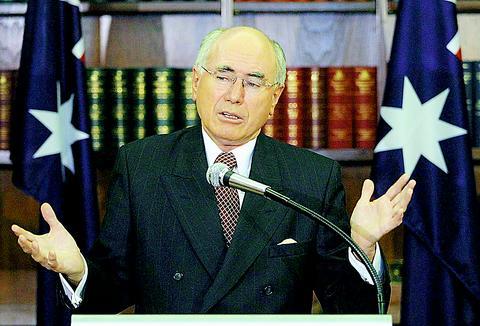Australian Prime Minister John Howard promised yesterday not to let his Oct. 9 election triumph go to his head as he was formally reappointed leader of his Liberal Party.
Howard, reanointed to lead Australia for his fourth consecutive term, signalled again that reform of industrial relations legislation is a top priority.

PHOTO: EPA
But he promised sober government and vowed to keep his election promises.
"There's been a lot of comment about what we might do if we are fortunate enough to have a majority in our own right in the Senate," he told a meeting of Liberal Party legislators.
"The answer to that is very simple -- we'll do what we promised the Australian people we'll do and that does mean reforming Australia's industrial relations system.
"It does mean implementing other things which we have repeatedly taken to the Australian public. But we won't be allowing that circumstance to go to our head."
The 65-year-old veteran politician won a decisive victory after campaigning on his strong economic track record and tough stance on security.
Apart from an increased majority in the House of Representatives, the government won control of the Senate for the first time in two decades. Many of its key reform objectives were previously blocked in the upper house.
The new Cabinet is expected to be announced in the next few days, although Howard has indicated that several key figures will keep their current posts.
Also, Australia would consider negotiating a new security treaty with neighboring Indonesia to strengthen ties and incorporate counter-terror cooperation, Foreign Minister Alexander Downer said yesterday.
But Downer said there were no plans for Prime Minister John How-ard and Indonesian president-elect Susilo Bambang Yudhoyono to discuss a new treaty when Howard visits Jakarta for the former general's inauguration tomorrow.
"I'm making it clear that it's something that we would be prepared to have a look at," Downer told Australian radio.
"Perhaps we'd look at the police co-operation between us and other areas where we could could enhance co-operation between Australia and Indonesia and make it something of substance."
Australia and Indonesian police have worked closely since the 2002 Bali nightclub bombings that killed 202 people, including 88 Australians, and again since a car bomb exploded outside Australia's Jakarta embassy last month, killing nine Indonesians.
Downer said some Indonesians would probably oppose a new security pact with Australia because they did not want a foreign policy too closely associated with the West.
"I always say to the Indonesians: `Well, you don't want to look at it terms of east and west or north and south but want to think of it in terms of neighborhood relations.' We're Indonesia's next-door neighbor," Downer said.

A fire caused by a burst gas pipe yesterday spread to several homes and sent a fireball soaring into the sky outside Malaysia’s largest city, injuring more than 100 people. The towering inferno near a gas station in Putra Heights outside Kuala Lumpur was visible for kilometers and lasted for several hours. It happened during a public holiday as Muslims, who are the majority in Malaysia, celebrate the second day of Eid al-Fitr. National oil company Petronas said the fire started at one of its gas pipelines at 8:10am and the affected pipeline was later isolated. Disaster management officials said shutting the

US Vice President J.D. Vance on Friday accused Denmark of not having done enough to protect Greenland, when he visited the strategically placed and resource-rich Danish territory coveted by US President Donald Trump. Vance made his comment during a trip to the Pituffik Space Base in northwestern Greenland, a visit viewed by Copenhagen and Nuuk as a provocation. “Our message to Denmark is very simple: You have not done a good job by the people of Greenland,” Vance told a news conference. “You have under-invested in the people of Greenland, and you have under-invested in the security architecture of this

UNREST: The authorities in Turkey arrested 13 Turkish journalists in five days, deported a BBC correspondent and on Thursday arrested a reporter from Sweden Waving flags and chanting slogans, many hundreds of thousands of anti-government demonstrators on Saturday rallied in Istanbul, Turkey, in defence of democracy after the arrest of Istanbul Mayor Ekrem Imamoglu which sparked Turkey’s worst street unrest in more than a decade. Under a cloudless blue sky, vast crowds gathered in Maltepe on the Asian side of Turkey’s biggest city on the eve of the Eid al-Fitr celebration which started yesterday, marking the end of Ramadan. Ozgur Ozel, chairman of the main opposition Republican People’s Party (CHP), which organized the rally, said there were 2.2 million people in the crowd, but

JOINT EFFORTS: The three countries have been strengthening an alliance and pressing efforts to bolster deterrence against Beijing’s assertiveness in the South China Sea The US, Japan and the Philippines on Friday staged joint naval drills to boost crisis readiness off a disputed South China Sea shoal as a Chinese military ship kept watch from a distance. The Chinese frigate attempted to get closer to the waters, where the warships and aircraft from the three allied countries were undertaking maneuvers off the Scarborough Shoal — also known as Huangyan Island (黃岩島) and claimed by Taiwan and China — in an unsettling moment but it was warned by a Philippine frigate by radio and kept away. “There was a time when they attempted to maneuver